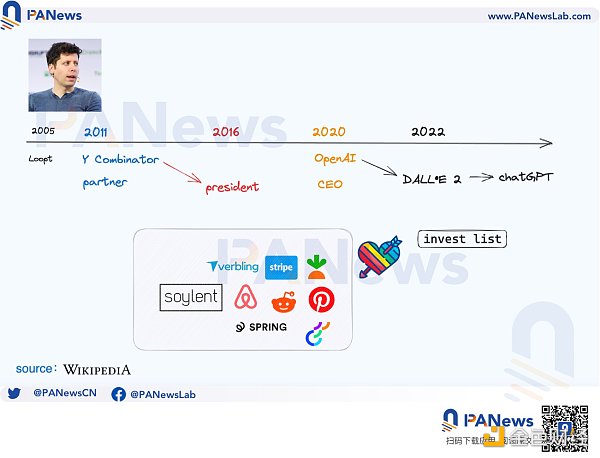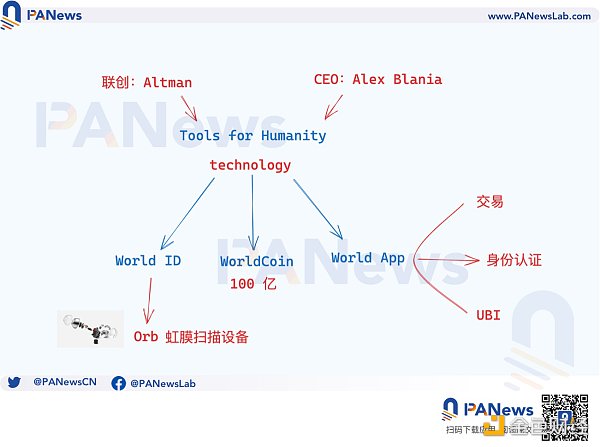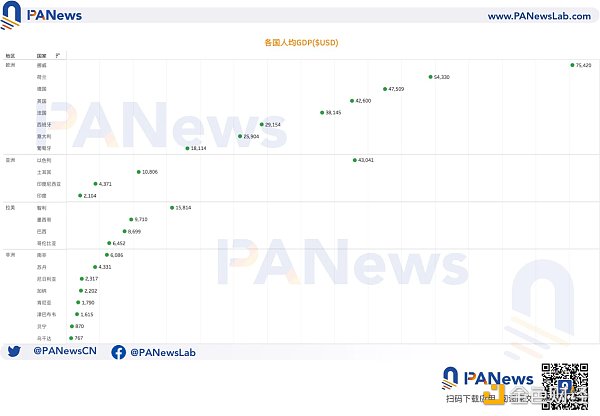Can the fluctuating Worldcoin and the UBI economics of the AI era come true?
Can Worldcoin's fluctuations and AI's UBI economics be realized?Original Author: Dark Side of the Moon, BlockingNews
Worldcoin has recently gained popularity due in part to its close ties with AI celebrity and OpenAI CEO Sam Altman, and in part to its announcement of plans for another $100 million financing round, which, according to BlockingNews, has already been greatly oversubscribed. In a bear market environment, it is a hot commodity in the market.
Prior to this, a16z had already led a $1 billion token financing investment at a valuation of $3 billion, and Worldcoin is now facing the moment of token issuance. At present, the use of the confirmed 20% share is to allocate 10% to team members and another 10% to investors.
Origin: The Challenge of Web3 and Altman’s UBI Dream
In 2019, Altman first proposed the idea of Worldcoin, which was initially prepared as an ID project. However, in reality, Alex Blania of the California Institute of Technology is its CEO, overseeing its daily operations, while Altman serves as its co-founder, with a focus on Open AI’s daily work.
- “Tactical” dissolution, division of national treasury assets, new profit model for DAO?
- MakerDAO Core Development Team proposed to increase the DAI savings rate from 1% to 3.33%
- Comprehensive overview of the gaming industry: Pie in the sky or an oasis in the desert
Overall, however, both can be considered the main operators of Worldcoin, as at the beginning, Worldcoin was tasked with popularizing Web 3 globally, which is also an important reason why it can work hand in hand with AI. In a sense, Web 3 can only truly fulfill Altman’s ultimate dream of UBI through integration with AI.
In early 2020, the COVID-19 pandemic spread globally, and European and American governments basically adopted quantitative easing policies, actively distributing consumption vouchers, subsidies, and even cash to the entire population to stabilize society. At this time, Altman’s UBI idea also found a kindred spirit. Sometime in early 2020, Alex Blania and Sam Altman hit it off, “What if there was a way to distribute digital tokens to everyone on the planet for free?”
The pandemic was the real catalyst for UBI, which led to large-scale social practice and guided Altman’s path, as he also disclosed in his blog that he hoped to use AI technology to conduct research on combating epidemic-related work.
Moreover, the use of hardware devices to ensure the real and reliable identity of ID is gradually taking shape. “There is a point that you need to connect with the physical world of this world, so you need hardware or a real ID,” which is also the theoretical source of Orb’s iris scanning device.
As far as this timeline is concerned, Altman almost simultaneously determined the technical routes of Open AI and Worldcoin, namely the LLM large model scheme in the AI field and the hardware+ID route in the cryptocurrency field. Then he led Open AI, and Worldcoin was actually operated by Alex Blania.
This is also more in line with Altman’s personal style in the investment field and actual enterprise operation, that is, while personally operating a company, investment business will continue to expand, but the actual operations of other companies will be led by others, and there will be less cases of Musk serving as the actual operator of multiple companies.

The combination of Crypto + AI
LLM is a victory in terms of parameter quantity, and its power has conquered the world. However, the popularity of cryptocurrencies has not been confirmed, but cryptocurrencies do face the same early and most important dilemma as AI-lack of users and scenarios, and few users have almost nothing to do except for transactions.
Regarding this issue, CEO Alex Blania of Worldcoin believes that “giving everyone ownership of this new protocol will be the” fastest “and” most popular cryptocurrency and Web3 popularization road to date, and it will be possible to solve one of the main challenges of Web3: relatively scarce users.”
And the logic of Crypto still needs time to verify. When it comes to specific product design, Worldcoin is developed by Tools For Humanity, and its product will be divided into three parts:
-
World ID: Orb scans the iris to establish personal identity;
-
Worldcoin: built on the OP super chain, the token will play an economic role on it;
-
World App: built-in transaction, identity recognition and UBI specific economic functions, hoping to precipitate Web 2 users here.
There have been numerous articles introducing Worldcoin, and this article is not about the specific details of the product, but about revealing the logic behind it and the product details of Worldcoin.

The productivity of the AI era will lead to the redundancy of social wealth. In an article in 2021, Altman believed that the wealth created by AI will be enough to meet the needs of everyone. He predicts that by 2031, AI could pay every American $13,500 per year.
After the success of the ChatGPT technology route, this goal no longer seems like a distant dream. The core issue has become how to ensure the orderly distribution of wealth, which is why individual identities need to be confirmed. In order to prevent common “witch” attacks, such as impersonation, from off-chain, DID has become a must-have.
Identity verification has become the basic premise for individuals to participate in the distribution of national welfare in the UBI era.
Middle Way: Aborted and Hidden Worries
Similar to the Web 3 native economic model such as P2E, Worldcoin has steadily increased its user base during 2021-2022, but during this period, it has also encountered privacy dilemmas, paid promotion and other public opinion vortexes, and even once faced a shutdown.
But benefiting from the explosion of ChatGPT, the current registration number of World App has exceeded 1.7 million, while its user number did not exceed 1 million until the end of 2022. However, it should be pointed out here that the number of app registrations and the number of people who accept iris scans are not equal. According to data from March 2023, CEO Alex Blania disclosed that only 450,000 people from 24 countries completed the full biological data collection.
Privacy dilemmas have not been completely resolved
According to its own statement, the data scanned by Orb will not be stored and maliciously used by Worldcoin, and ZK technology will gradually be adopted for higher intensity security protection. However, in some regions, its operating contractors will adopt incentive measures to encourage local residents to submit data, so users will be required to provide proof of identity to prevent duplicate claims.
In addition, there have been cases of data trading. According to the company spokesperson, there have been cases of collecting iris scans of local villagers in Southeast Asia and selling personal encrypted users for $30 or less to help complete app registration, and the driving force behind this is the possible token airdrop.
More seriously, there is a contradiction between regulatory intervention and data processing.
Worldcoin has a registered subsidiary in Germany, and according to the principles of GDPR regulations, any data that operates within the EU or involves EU residents is subject to EU regulation. However, the fact that Worldcoin operates globally conflicts with EU regulations. For example, it claims that 1% of the population in Portugal has become its user, but how to handle global data has not been fully explained. According to GDPR regulations, “failing to adequately protect data may result in a fine of up to 4% of global revenue or 20 million euros.”
The second issue is the hidden problem of “digital exploitation” of the third world. Restricted by regulatory policies of various countries, residents of countries such as China and the United States can register their App, but cannot be certified by World ID. According to official data, most of the registration locations of Worldcoin are poor countries, such as Africa and Latin America. Currently, the number of countries and regions participating in its testing is 24, of which 14 are developing countries and 8 are located in Africa. The specific distribution and per capita GDP are as follows:
-
Africa: Benin, Ghana, Nigeria, South Africa, Sudan, Zimbabwe, Kenya and Uganda;
-
Latin America: Brazil, Chile, Colombia, Mexico;
-
Europe: France, Germany, Italy, the Netherlands, Portugal, Spain, the United Kingdom, Norway;
-
Asia: India, Indonesia, Israel, Turkey

In early May, it had been hacked and some passwords leaked. Although it was due to the dealer’s failure to keep the information confidential, if the data before it was uploaded to the blockchain cannot be guaranteed, then the privacy of the data after it is uploaded to the blockchain will also be compromised.
Not only are hardware devices prone to problems, but the underlying architecture of its chain has also undergone multiple changes, and it seems that it is not a completely self-researched project.
Multiple changes in underlying architecture technology
Although Worldcoin aspires to be the first crypto project aimed at global users, not all of its technologies are self-researched, but are stacked based on existing mature technologies to avoid scattered focus and focus on identity recognition and operators.
As an example of its underlying architecture, Worldcoin chose to collaborate with mature existing products in the early stages of the project, starting with Hubble, but it was mainly used in payment scenarios and could no longer meet the needs later on. It later switched to Polygon, but as Worldcoin took on more scenarios, it ultimately turned to Optimism’s super-chain architecture. Worldcoin first encountered Layer 2 such as Optimism in 2020, but only began to cooperate with it after its plan matured.
To some extent, Worldcoin does not have many innovations and highlights in the field of cryptocurrency. It focuses more on popularization and user acquisition. What it really cares about is how to combine existing technologies to bring billions of people worldwide into the Web 3 field.
In its plan last year, it planned to use ZKP technology for offline identity proof, which it called PPPoPP (Privacy-Preserving Proof-of-Personhood Protocol). It mainly puts offline information on the chain after ZK calculation to meet the demand for privacy protection, but at that time it still adopted Hubble’s plan. After turning to the super-chain, its data throughput can be further amplified, and the use of Gas Fee will be reduced.
Moreover, after collecting data, it can use ZK-protected data for machine learning through the ZKML plan without violating personal privacy, to explore more usage scenarios using collected data.
It can be summarized that in Worldcoin’s plan, encryption technology, ZKP, and AI technology are not mutually exclusive options, but next-generation network technologies that can be combined with each other. The premise of all this is that there are enough users to generate enough user data, enrich the usage scenarios of tokens, and ultimately support the progress of productivity to meet the operational needs of UBI.
Conclusion: Does UBI have any potential?
Unlike the rapid progress of AI, UBI and cryptocurrency still face many doubts, especially whether using cryptocurrency as a popular measure of UBI can be effective, which is still an unsolvable problem.
The logic of UBI is not complicated. The total production of human society is currently greater than the total demand, but due to uneven distribution, there is widespread inequality between poor and rich countries, high-income and low-income groups, and even between men and women and generations. The idea of UBI is to redistribute social wealth in a relatively gentle way.
For example, ImBlockingctMarket on Celo has already attempted to provide financial and educational services to residents of the third world, increasing their livelihoods and living standards via Crypto UBI. UBI does not need to forcibly change the current distribution relationships, but instead provides equal access to everyone through the issuance of new tokens. Similarly, Chinese economist Zhai Dongsheng has also envisioned a Chinese version of UBI — “A New Redistribution Scheme for the Co-Prosperity Era: A Preliminary Study of Future Starting Income,” which provides digital currency support to Chinese residents aged 0-35 from the central government’s currency debt and tax revenue, and provides one-time education or skill training subsidies to Chinese residents over the age of 35.”
Whether Worldcoin succeeds or not, it will be the first large-scale UBI experiment aimed at all humanity. Previous attempts have generally not received widespread attention. For example, Circles also falls under the UBI category, but its current regular participation in governance is less than a thousand people and remains a small-scale experiment.
By leveraging cryptocurrency with Worldcoin, this will be the first attempt to face hundreds of millions, at least millions of ordinary users globally, most of whom were not Web 3 users before. From this perspective, at least it has taken a step towards true mass adoption in the popularization of cryptocurrency.
We will continue to update Blocking; if you have any questions or suggestions, please contact us!
Was this article helpful?
93 out of 132 found this helpful
Related articles
- Mint Ventures Talks with Pendle CEO: Seizing Hotspots to Build Breakthrough Products
- Web3 Social: DID First, DAPP Second
- Understanding Rare Con is just one article: what other expandable gameplay is there?
- Understanding Consensus Mechanism and 11 Popular Consensus Algorithms in One Article
- Summary of the 162nd Ethereum Execution Layer core developer meeting: The reasonable target time for the Cancun upgrade is October.
- Explaining Futures Contracts in Contango: Low and Predictable Costs
- How has Sui mainnet performed after being online for 3 weeks? A article interpreting its data and community sentiment.





